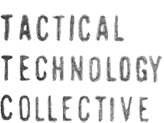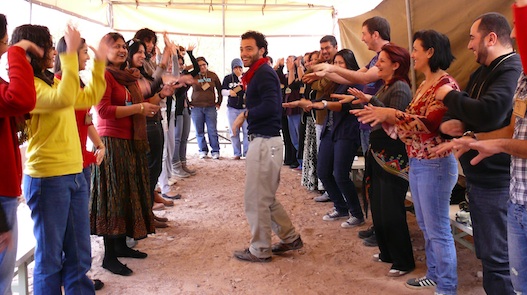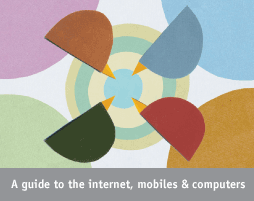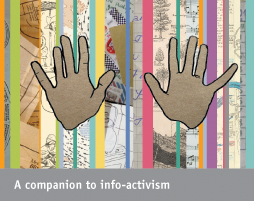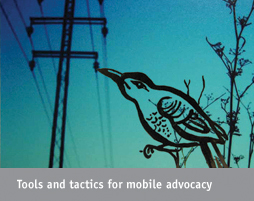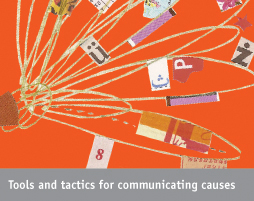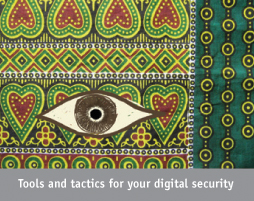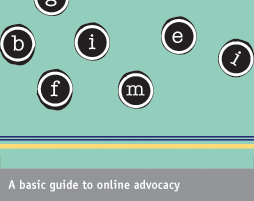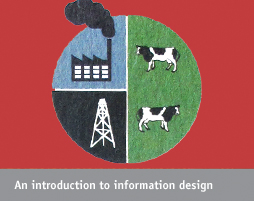Visualising Women's Rights
The group doing "jazz hands" at the sunrise circle. Photo by Samah Arafat.
“Inspiring”, “diverse”, “useful”, “new” “creative”, “fun”, “challenging” and “exciting” are some of the words used by participants of the Visualising Women's Rights in the Arab World (VWR) workshop, to describe their experience.
Conceptualised and organised by Tactical Tech and hosted at the community-run Feynan EcoLodge in a remote location in the Jordanian desert, the workshop brought together 44 activists working on a variety of women's rights issues in the Arab region for a 3-day adventure of skill-share and learning around the subject of visual advocacy. Here, participants were able to escape their inboxes and everyday commitments, and enter a space designed to inspire creative thinking and problem-solving around campaigning. They explored how information and data can be visualised, through images, animation, info-graphics, and maps to communicate their issues clearly and impact their target audience.

Remote and surrounded by a dramatic landscape, the workshop venue, Feynan Ecolodge. Photo by Sarah Rifaat.
At the same time as learning through facilitation, participants were provided with the space and time to learn from each other and make the connections that are so vital to activist work. Ghaida'a Al-Absi who works on training women in new media in Yemen, and was sponsored by Rising Voices to attend the event, said that the participants “all have great experience, they are all creative and smart so it's great to be around them and learn from them.” On the second day of the event, she had already connected with another participant who will introduce her to the people behind the Cairo-based Harassmap to help her with her plans to implement her own project mapping sexual harassment on the streets of Yemen.
The days began with a “sunrise circle”, an open forum for the group to come together, prepare for the day, and for announcements to be made. This was followed by the morning “plenary sessions” designed to involve the entire group in discussion and learning around evidence-based campaigning and initiate critical thinking about examples of visual campaigns and why they work. For example the “Visual Gallery” exercise, held in the courtyard of Feynan, got participants, in groups, to look at a selection of strong visual campaigns on a range of rights issues and analyse the components of strategy behind them.
Maya Ganesh, who led this project and emceed the entire event, says that while participants responded emotionally to many of these images, “they also had to dig deeper and ask questions that reveal that it's not just about a pretty picture, it's not just about evoking emotions, but it's about being extremely strategic in who you're targeting, whose mind you're trying to change and who you're trying to persuade.” At the same time , this made participants examine the kinds of data and information used in these campaigns. She says: “For me it was really interesting to see people realising that, it's not only about scientific data and primary research but you can find data in the most unexpected places and play with very different kinds of data, bringing them together in a visual campaign. The possibilities are really endless.”

Discussion on the effectiveness of the campaign examples in the Visual Gallery. Photo by Samah Arafat.
After the plenary session, and after a delicious organic vegetarian lunch, and maybe a cup of herbal tea prepared by the local Bedouin staff, participants spent the afternoon in one of the three tracks they had chosen to complement the campaigns they are currently working on or hoping to develop. The tracks were intensive hands-on practice sessions in the use of either geographical mapping, information design or imaging and animation techniques for campaigning. The facilitators for these tracks included: Tactical Tech's co-founders Stephanie Hankey and Marek Tuszynski leading Information Design, Southern African animator and social scientist, Tessa Lewin, and Egyptian art-activist, Sarah Rifaat, on imaging and animation, and mappers, Sandra Sudhoff from the German NGO, CartONG and, Abdelrahman, a blogger and techie from Egypt.

Participants on the imaging and animation track working on their animation. Photo by Sarah Rifaat.
In the evenings, which were lit only by candlelight and a sky full of stars, people took part in organised activities or entertained the group with light photography, and singing and music led by those who'd brought along their instruments. On the second night, participants gathered in the Bedouin tent for a barbeque and bazaar where some set up 'stalls' to present and discuss their campaign idea with anyone who was interested. The last evening was spent doing a sunset hike and watching documentaries. The award-winning feature, Budrus, which highlights women’s role in the unarmed popular resistance movement in town by the same name in the Occupied Palestinian Territories was screened along with The Kingdom of Women produced by a Lebanese filmmaker, Dahna Abourahme, and Tactical Tech's 10 tactics for turning information into action.

Light photography by Sarah Rifaat and Samah Arafat.
At the end of the three days, participants from the three tracks came together to present what they had been working on. Those from the animation track had already created their own short animations around issues such as domestic violence and marital rape. Razan Rashidi, a participant on the information design track who is Communications Officer and a member of the Gender Focal Team at Unicef Syria, had put together a presentation of her planned campaign to empower young girls to reclaim public spaces which are usually dominated by men in Syria. She says she had come to the workshop with a vague idea for a campaign “disturbing the norms of spaces” but had been inspired, by the example of the Blank Noise campaign, to get women to photograph their favourite public spaces in Damascus which they do not feel comfortable in because of their sex. Lana Al-Salem, who has an IT day-job and volunteers for Jordan based NGO, Follow the Women, in her free time, is planning to map the journey a group of women do every year as they cycle through Syria, Jordan, Lebanon and Palestine, raising awareness about how “the painfully slow peace process blights the lives of innocent women and children.” She wants to document the difficulties women encounter when trying to cross borders in this region.
In the coming months, Tactical Tech will select ten campaigns to support through micro-grants. We will also be posting profiles of some of the participants and following up with information on their campaigns on the Visualising Women's Rights website.
